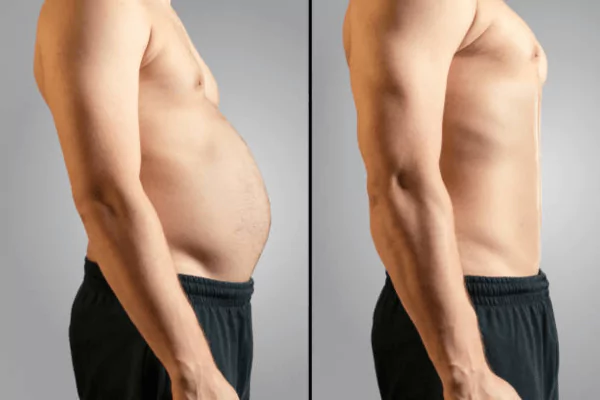Belly fat, or visceral fat, is one of the most stubborn areas to lose weight from. Excessive belly fat not only impacts your appearance but also puts you at risk of various health issues such as heart disease, type 2 diabetes, and high blood pressure. Losing belly fat can be a challenge, but it is not impossible. In this article, we will discuss effective ways to lose belly fat, debunk common myths about belly fat, and provide helpful tips to achieve your weight loss goals.
What is Belly Fat?
Belly fat is the type of fat that is stored around your abdomen, specifically around your internal organs such as the liver, pancreas, and intestines. Unlike subcutaneous fat, which is located directly under the skin, visceral fat cannot be pinched or grabbed. It is an active tissue that releases hormones and inflammatory substances, increasing your risk of chronic diseases. The amount of belly fat you have is often determined by your genetics, age, sex, and lifestyle.
The Importance of Losing Belly Fat
Losing belly fat is crucial for improving your overall health and reducing the risk of chronic diseases. Visceral fat is linked to insulin resistance, inflammation, and metabolic syndrome, which are risk factors for type 2 diabetes and heart disease. Additionally, carrying excess weight around your midsection can lead to poor posture, back pain, and reduced mobility. Shedding belly fat can help you feel more confident, improve your physical abilities, and enhance your quality of life.
Myth vs. Reality: Debunking Common Misconceptions About Belly Fat
There are several misconceptions about belly fat that can make weight loss seem more complicated than it needs to be. Here are some myths debunked:
Myth: Targeted Exercise Reduces Belly Fat
The reality is that spot reduction is not possible. Doing crunches or sit-ups will not magically eliminate belly fat. While exercises that target the abdominal muscles can strengthen and tone them, they will not burn significant amounts of fat. The key to losing belly fat is to engage in exercises that burn overall body fat, such as cardiovascular exercise and strength training.
Myth: Dieting is the Only Way to Lose Belly Fat
While diet plays a crucial role in losing weight, it is not the only factor. Engaging in regular physical activity and getting enough sleep is just as important for losing belly fat. In fact, combining healthy eating habits with exercise is the most effective way to reduce belly fat.
Myth: Fat-Burning Supplements are Effective for Losing Belly Fat
Fat-burning supplements, such as green tea extract and garcinia cambogia, are often marketed as effective solutions for losing belly fat. However, there is limited scientific evidence to support their effectiveness. Moreover, these supplements may have side effects and can interact with other medications. Therefore, it is best to consult a healthcare professional before taking any supplements for weight loss.
Losing belly fat requires a combination of healthy eating habits, regular physical activity, and lifestyle changes. Here are some effective strategies to help you lose belly fat:
Cardiovascular Exercise
Engaging in cardiovascular exercises, such as running, cycling, or swimming, can help burn calories and reduce overall body fat, including belly fat. Aim for at least 30 minutes of moderate-intensity aerobic exercise per day, five days a week. You can gradually increase the duration and intensity of your workouts as you become fitter.
Strength Training
Incorporating strength training exercises, such as weightlifting or bodyweight exercises, can help build muscle mass and boost your metabolism. This can help you burn more calories and fat, even at rest. Aim for two to three strength training sessions per week, targeting all major muscle groups.
Healthy Eating Habits
Adopting healthy eating habits is crucial for losing belly fat. Focus on eating a diet rich in whole, nutrient-dense foods such as fruits, vegetables, whole grains, lean protein, and healthy fats. Avoid processed foods, added sugars, and saturated and trans fats. Monitor your portion sizes and aim to eat slowly, savoring each bite.
Adequate Sleep
Getting enough sleep is essential for overall health and weight management. Chronic sleep deprivation can disrupt your hormones, leading to increased appetite, cravings, and weight gain, including belly fat. Aim for at least seven to eight hours of quality sleep per night.
Reduce Stress
Chronic stress can lead to increased cortisol levels, which can cause the body to store excess fat, including belly fat. Incorporate stress-reducing activities into your daily routine, such as meditation, yoga, deep breathing, or taking a relaxing bath.
Tips for Losing Belly Fat
In addition to the strategies mentioned above, here are some helpful tips for losing belly fat:
Drink Plenty of Water
Drinking plenty of water can help keep you hydrated and reduce your appetite. Aim for at least eight glasses of water per day.
Eat More Fiber
Fiber-rich foods, such as fruits, vegetables, whole grains, and legumes, can help keep you full and reduce your calorie intake. Aim for at least 25-30 grams of fiber per day.
Avoid Processed Foods and Sugar
Processed foods and added sugars can contribute to belly fat accumulation. Try to limit your intake of processed foods and added sugars, opting for whole, unprocessed foods instead.
Incorporate Protein in Your Diet
Protein can help increase satiety, reduce cravings, and boost your metabolism. Aim for at least 20-30 grams of protein per meal, including lean protein sources such as chicken, fish, tofu, or legumes.
Cut Back on Alcohol
Alcohol consumption can contribute to belly fat accumulation, as it is high in empty calories and can disrupt your metabolism. Try to limit your alcohol intake or avoid it altogether.
Conclusion
Losing belly fat can be a challenging but achievable goal. By incorporating healthy eating habits, regular physical activity, and lifestyle changes, you can reduce belly fat, improve your overall health, and enhance your quality of life. Remember to be patient and consistent, and always consult a healthcare professional before starting any new exercise or diet regimen.



